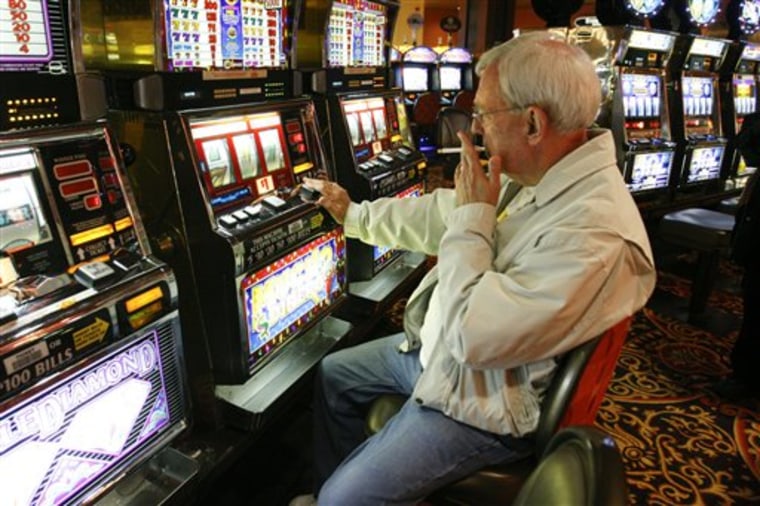In this economy, lawmakers are more willing to let people smoke 'em if they got 'em.
As recently as last year, many states and major cities seemed ready to adopt complete indoor smoking bans. But the movement to kick all smokers outdoors has stalled as the recession worsens and lawmakers fear hurting business at bars, restaurants and casinos.
"This economy, it creates a little more sympathy for the business person. So when we say this is going to put us out of business, believe me, they're listening," said Mike Moser, executive director of the Wyoming State Liquor Association.
Twenty-three states, as well as Washington, D.C., and Puerto Rico, have indoor smoking bans covering bars and restaurants. No one else has adopted a ban in the early weeks of this year's legislative sessions.
In Colorado, lawmakers are considering easing the rules after they banned smoking in most bars, restaurants and casinos.
New Jersey put off a smoking ban for Atlantic City casinos after five of 11 casinos warned they could file for bankruptcy by year's end. In Virginia, a proposed statewide ban stalled this year after lawmakers expressed concern about the economy.
Moser's group opposes an indoor smoking ban that has been offered in Wyoming. After businesses raised objections, state lawmakers last month exempted bars from the legislation.
In cities that have banned smoking in bars, "it's just killing them," said Mike Reid, owner of a wine bar in Casper. Reid voluntarily banned smoking in his bar, but opposes the forced ban as president of the liquor association.
"When someone builds a business with a clientele that smokes, they should be able to go in there and smoke," Reid said.
Health advocates are citing the economy to argue their side, too. With state budgets burdened by rising health care costs, banning smoking saves the government money in the long run, they say.
In Kansas, which has no statewide ban, advocates are circulating a new state health report predicting Kansas would save $20 million in health care costs the first year smoking is banned in bars and restaurants.
"This whole economic argument is hogwash, scientifically, but that doesn't mean it's not politically useful," said Dr. Stanton Glantz, director of the Center for Tobacco Control Research and Education at the University of California, San Francisco.
Glantz says reputable studies show indoor smoking bans do not hurt businesses, and he urged politicians to ignore complaints from bar owners that smoking bans will ruin them.
"There's a growing realization that tobacco control is good for business — all businesses except for the tobacco companies," Glantz said.
Health advocates also say the existing patchwork of tobacco regulations puts nonsmoking restaurants at an economic disadvantage in states such as South Carolina and Wyoming.
South Carolina Rep. Todd Rutherford, a Democrat who has proposed a statewide ban, said if lawmakers don't want to hurt any businesses, they "need to make this uniform."
But Virginia Delegate Tom Gear, a Republican, said other lawmakers oppose new smoking bans for the same reason.
"Why should government tell a business how to do business?" Gear said.
Virginia lawmakers also rejected two tobacco tax increases this year, in part because of hesitancy to raise taxes in a recession.
In Colorado, a bill expected to be introduced this session would make it easier for taverns and casinos to seek exemptions to the ban by being classified as cigar-tobacco bars.
The bill would undo a requirement that a business must have been in place since 2005 to get an exemption.
That change would mean all bars, bowling alleys and casinos in Colorado could set aside 25 percent of their space as smoking areas as long as they derive 5 percent of their annual income or $50,000 a year from tobacco sales. Patrons would have to buy tobacco products in-house before smoking.
Anti-smoking activists thought their yearslong effort to pass Colorado's ban was over.
"We thought we had moved on," said Stephanie Steinberg, chairwoman of a suburban Denver group called Smoke-Free Gaming. "Why are we going back in time and talking about reversing what we we're done to protect the health of so many people?"
Her group had planned to focus its lobbying efforts on Las Vegas this year but instead redeployed to Colorado, which banned smoking in bars and restaurants in 2007 and in casinos last year.
In Atlantic City, N.J., city officials banned smoking on casino floors for a single month last year, but they repealed the rule after casinos complained. A telephone poll released this week indicated public support for banning smoking at casinos dropped as the economy worsened.
"To say that people want to roll back smoking laws because of the economy, it's absurd," said Karen Blumenfeld, who runs the New Jersey Group Against Smoking Pollution. "We might as well roll back health codes because the economy's bad. Or repeal child-labor laws to make factories more profitable. It makes no sense."
Opponents of indoor bans insist they are not just blowing smoke about the economy.
In a recession, people tend to cut back on discretionary spending, "and the hospitality industry, whether it's a bar or a restaurant, is one of the first things to get pruned," Moser said.
